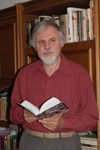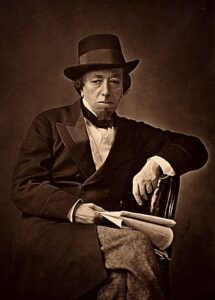By Alex Gordon


Disraeli was born into a middle-class London family in 1804, when the capital’s Jewish population numbered just over 20,000. He was the eldest son of a literary man who left the Jewish community a year before his son’s bar mitzvah, and was baptized according to his father’s will. Although Disraeli was raised in the bosom of the Church of England, he kept and emphasized his Jewish identity. His Jewish pride was so infectious that even the Jew-hater Karl Marx, in a letter to his relative Lyon Phillips, grandfather of the founders of the famous company, called him “our tribesman.” Disraeli proudly noted, “The masses of laborers rest every seventh day thanks to Jewish legislation; they read […] texts of Jewish history without interruption and sing Jewish psalms and [hear] the lamentations of Jewish poets.”
In 1837, after a trip to Egypt and the Holy Land, he was elected to Parliament on behalf of the Conservative Tory Party. While debating a bill to allow Jewish candidates for Parliament to take an oath in the name of their religion, Disraeli, contrary to his Conservative party’s view, declared, “Know that you owe something important to this nation, your Christianity. It is as a Christian that I will not take the terrible responsibility of excluding from Parliament the representatives of the religion in which our Lord was born.” He reminded the audience that Jesus would not have been admitted to the British Parliament either. The bill passed with 257 votes in favor and 186 votes against. Disraeli was among the two Tories who supported this legislation.
Disraeli was willing to commit political suicide to protect the Jews, although he himself ceased to be a Jew before reaching religious adulthood. He did not join the gray conservative majority. He refused to accept being Jewish as a belittling limitation. Disraeli defiantly declared that Jews embodied what he wanted to see in England: initiative, ferment, curiosity, culture, charity, productivity, power and colorfulness. He supported the law to admit Jews to Parliament because it was good for England as illustrating a turn from the persecutions of the past to the path to a new age in which talent need not worry about its origins. Disraeli became chairman of the Spanish-Portuguese synagogue his father left behind. He befriended the first Jewish member of the British Parliament, Lionel Rothschild.
Winston Churchill provided the following characterization of Disraeli: “Disraeli, the Jewish Prime Minister of England and leader of the Conservative party, who was always true to his race and proud of his ancestry, once said: “God treats the nations as they treat the Jews.” He was always an outsider, unpopular in his party. Appointing him as Prime Minister for the first time in 1868, Queen Victoria, who treated Disraeli better than any other man who occupied No. 10 Downing Street in all 64 years of her reign, wrote to her daughter that he was her “man of the people.” For six years this man headed the government of England. The selection of a Jew as Prime Minister of conservative and rather Judeophobic England in the nineteenth century is an incredible fact.
Disraeli’s opponents kept returning to the theme of his Jewish origin in their attacks. The higher he climbed up the “slippery pole” – as Disraeli himself called the struggle for success in politics – the more voices were heard from those who called him a “foreigner” and “insufficient” Englishman. The rural squires who dominated the Conservatives of that era considered Disraeli’s appearance to be alien rather than exotic, if not downright strange. As a young man, wrote historian Jonathan Perry, he “was elegantly and attractively dressed, wearing crimped shirts, velvet pants, colored vests and jewelry. His hair was styled in a cascade of curls.”
During Disraeli’s most successful parliamentary election in 1837, his radical opponent deliberately mispronounced his last name so that voters would not forget the candidate’s foreign roots. Anti-Semitic voters shouted “Shylock” and waved pieces of bacon put on a stick in Disraeli’s face. Later, liberal politicians and newspapers – one of which consistently referred to him as “B. Deiuda” – vented their anger at Disraeli using the harshest anti-Semitic language. The traditional anti-Jewish charges of dual loyalty and conspiracy were used against the Prime Minister.
On a trip to the Middle East in 1831, Jerusalem “astonished” him, but he remained indifferent to Jewish life and to the Jewish monuments of this “splendid city.” But Disraeli sometimes extolled the Jews and the superiority of the “Jewish race.” The election of Lionel Rothschild – with whom he had become friends, as with other members of the English branch of that family – meant that Disraeli could no longer keep quiet about the Jewish problem. “The chief reason for accepting the Jews,” he declared,”is that they are intimately connected with you. Where is your Christianity if you do not believe in their Judaism?” Disraeli best described his own ambivalent attitude toward Judaism by calling himself “the white page between the Old Testament and the New Testament.”
On July 1, 1878, as a result of the congress convened to revise the Treaty of San Stefano, which ended the Russo-Turkish War of 1877-1878, the Treaty of Berlin was signed, leveling almost all the military successes of anti-Semitic Russia. Disraeli played a major role in this. Under his pressure, the Berlin Treaty adopted by the Congress included a paragraph guaranteeing the civil rights of Jews in the Balkan states that had become independent of Turkey. Bismarck presided over the Congress, and Disraeli led the British delegation. After the Russian surrender achieved by Disraeli, Bismarck could not hide his admiration: “Der alte Jude, das ist der Mann!” (“That old Jew, what a man!”).
The French writer of Jewish origin Andre Maurois, author of the biography of Disraeli, wrote: “The outstanding virtues of Disraeli constantly reminded me that to overcome centuries of prejudice, a Jew must be as impeccable as human nature allows; his honesty and reliability must be a living refutation of malignant fictions. Disraeli’s fabulous courage broke the resistance of his foes, and he achieved universal love and recognition.”
*
Alex Gordon is professor emeritus of physics at the University of Haifa and at Oranim, the academic college of education, and the author of 10 books.